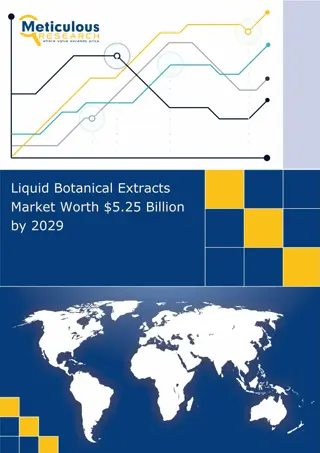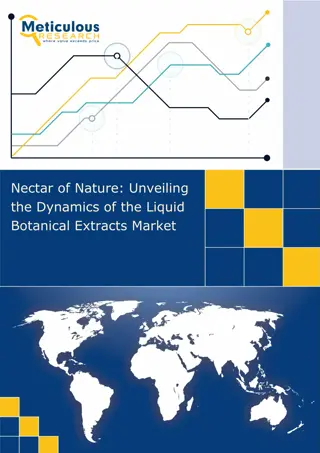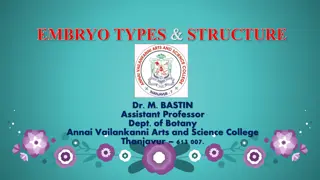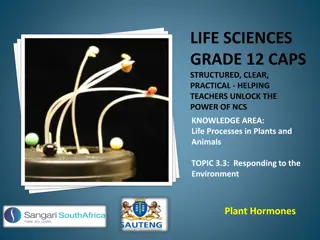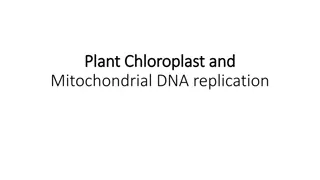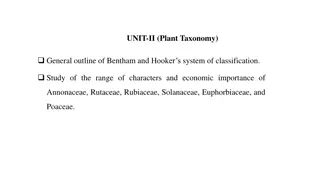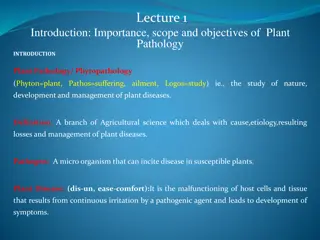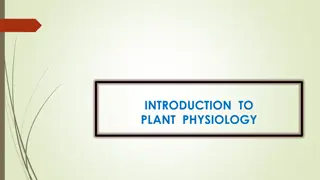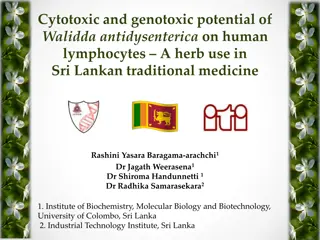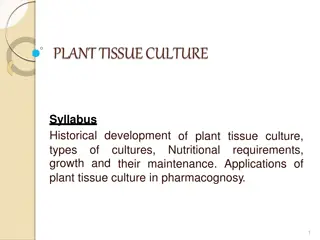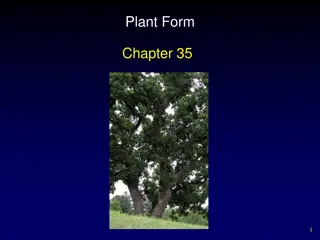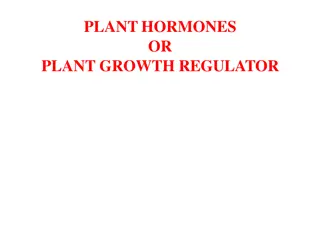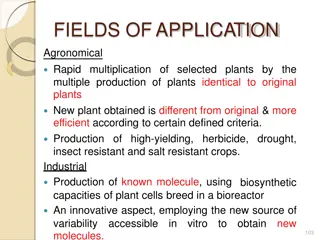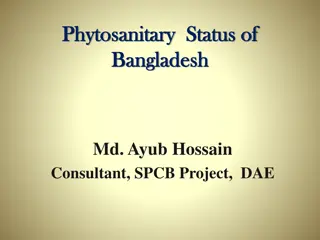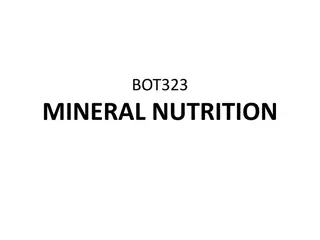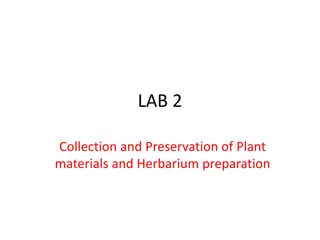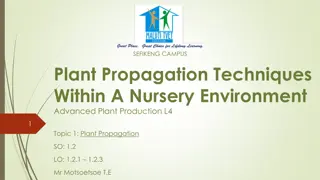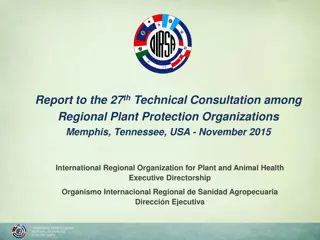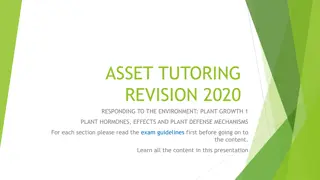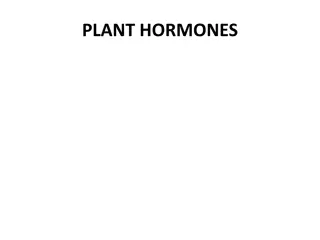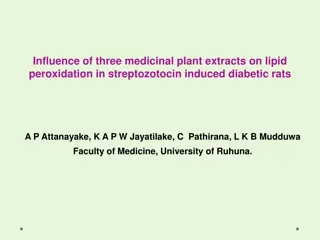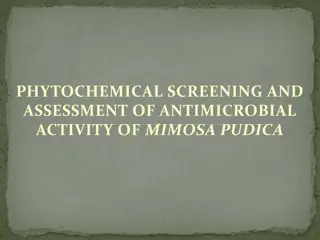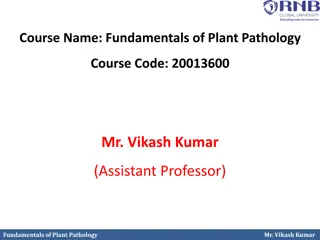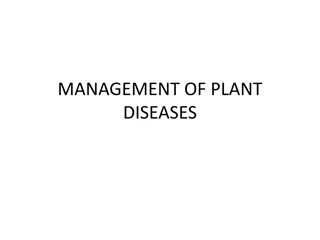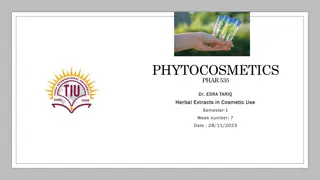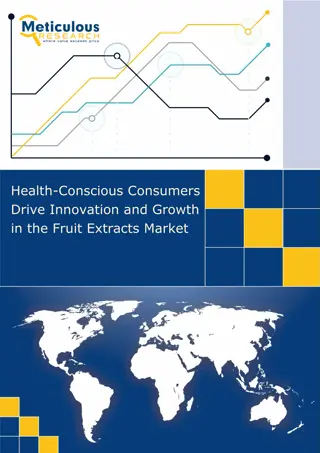Unit 1: Introduction and History of plant pathology
The science of plant pathology, which studies plant diseases and aims to protect the food supply by improving plant survival in unfavorable conditions. Explore the causes of plant diseases, their symptoms, and methods of prevention and control.
5 views • 13 slides
Amway Nutrilite All Plant Protein Powder 1kg Deutsche Post AG
Amway Nutrilite All Plant Protein Powder is a premium source of protein derived from plant-based ingredients. With each serving, you get a blend of high-quality protein to support your active lifestyle and dietary needs.\nAmway Nutrilite All Plant Protein Powder offers a convenient way to supplement
1 views • 4 slides
Liquid Botanical Extracts Market Worth $5.25 Billion by 2029
The rising demand for liquid botanical extracts in cosmetic applications, growing demand for ready-to-use botanical extracts, increasing health and wellness trends with consumption of natural health products, and increasing awareness regarding the benefits of herbal products over synthetic products
3 views • 4 slides
Liquid Botanical Extracts Market Share Worth $5.25 Billion by 2029
Comparatively, natural liquid botanical extracts provide a superior alternative to synthetic ingredients to infuse pleasant, rich, and earthy colors into a product. Liquid botanical extracts contain specific bioactive compounds that offer unique skin-enhancing benefits for streamlined cosmetics. For
0 views • 4 slides
Milk Thistle Extracts Market Research Report 2019-2029|Relevant Trend, Overview
The Milk Thistle Extracts Market,\u00a0research, a thorough examination of the state of the industry, market size, demand trends, development patterns, and projections from 2019\u00a0to 2029, was just published by Adroit Market Research.
0 views • 5 slides
Dab press machine
A notebook dab press machine is a compact, portable device that extracts oils from botanical materials. Typically featuring dual heated plates, it applies precise pressure and temperature to release the essential oils and resins. Perfect for small-scale personal use, offering a user-friendly interfa
3 views • 2 slides
TOP 10 COMPANIES IN LIQUID BOTANICAL EXTRACTS MARKET
Powdered botanical extracts dissolve appropriately, while liquid botanical extracts are ready-to-use. Thus, they provide convenience and ease of use for cosmetics and pharmaceutical formulators. Moreover, the inclusion of single or multiple liquid botanical extracts in a formulation makes it possibl
0 views • 4 slides
Understanding Plant Embryogenesis: A Comprehensive Overview
Plant embryogenesis is a crucial process in the development of plant embryos from fertilized ovules, involving cell division, differentiation, and morphogenesis. This process leads to the formation of seeds, which play a vital role in the plant life cycle. The stages of embryo formation, structure,
0 views • 25 slides
Understanding Plant Tissue Culture: Methods and Requirements
Plant tissue culture involves the in-vitro culture of plant explants under aseptic conditions, covering cell, organ, and suspension cultures. This process, pioneered by German botanist Gottlieb Haberlandt, relies on the totipotency of plant cells. Key requirements include laboratory organization, su
0 views • 18 slides
Understanding Plant Hormones and Their Functions in Plants
Plant hormones play crucial roles in various plant processes such as growth, development, and response to environmental stimuli. Auxins, gibberellins, and abscisic acid are key plant hormones that regulate tropisms, cell division, elongation, flowering, seed germination, and dormancy. Understanding
0 views • 50 slides
Plant Mitochondrial and Chloroplast DNA Replication Mechanisms
Plant mitochondria and chloroplasts have intricate DNA replication processes. Mitochondrial DNA replication is independent of the plant cell cycle and is associated with specific proteins in nucleoid complexes. Plant mtDNA contains more genes than animal mtDNA, with a complex structure involving int
1 views • 16 slides
Overview of Bentham and Hooker's Classification System in Plant Taxonomy
Bentham and Hooker's system of classification in plant taxonomy, outlined in Genera Plantarum, provided detailed descriptions of families and genera based on original plant dissections. This classification system has practical value for plant identification, with keys for taxa and subdivisions for l
2 views • 47 slides
Understanding Plant Tissue Culture Media and Their Importance in In Vitro Growth
Plant tissue culture media play a crucial role in the in vitro growth and morphogenesis of plant tissues. The composition of culture media depends on the specific plant species and the type of material used for culture. Various types of media, such as White's medium, MS medium, B5 medium, N6 medium,
0 views • 6 slides
Understanding Shakespeare's Extracts for WJEC A-Level English Literature Unit
Explore strategies for analyzing Shakespearean extracts effectively in the WJEC A-Level English Literature Unit, focusing on key points, detailed support, verbatim recall of critical views, and interpreting context. Learn how to prepare and respond to the Shakespeare extract questions, emphasizing c
0 views • 19 slides
Exploring Shakespeare's Use of Language in Macbeth's Mini Extracts
Delve into Shakespeare's masterful use of language in mini extracts from Macbeth's Act 1 scenes, analyzing how he creates a sense of unease, excitement, and deceptive appearances through techniques like short sentences, rhythm, alliteration, and metaphors. Dive into the world of Macbeth and uncover
0 views • 46 slides
Understanding Plant Pathology: Importance, Scope, and Objectives
Plant pathology, also known as phytopathology, is the study of plant diseases and their management. It covers the causes, symptoms, and impact of pathogenic organisms on plants. The field aims to understand the interactions between plants and pathogens, develop control methods, and reduce losses in
0 views • 6 slides
Introduction to Plant Physiology: Exploring the Functioning of Plants
Plant physiology is a crucial subdiscipline of botany that delves into the processes and functions operating within plants. This field closely examines areas like plant morphology, ecology, cell biology, and genetics, shedding light on vital processes such as photosynthesis, respiration, and more. T
1 views • 7 slides
European Standards for Plant Biostimulants Development
The European Committee for Standardization (CEN) plays a crucial role in developing European standards for plant biostimulants, focusing on improving plant nutrition processes independently of nutrient content. The CEN/TC.455 committee is responsible for creating standards supporting the EU Fertilis
2 views • 5 slides
Understanding Plant Tissue Culture: Techniques and Applications
Plant tissue culture involves maintaining and growing plant cells, tissues, or organs in artificial mediums under controlled conditions. It allows the regeneration of whole plants from small plant parts or cells. Hormones like auxins, cytokinins, and gibberellins are used in the process. Proper envi
3 views • 5 slides
Cytotoxic and Genotoxic Potential of Walidda Antidysenterica on Human Lymphocytes: A Study in Sri Lankan Traditional Medicine
Investigating the cytotoxic and genotoxic effects of Walidda antidysenterica extracts on human lymphocytes in Sri Lankan traditional medicine. The plant is widely used for its diverse medicinal properties, including treating various diseases and promoting overall health. The study aims to understand
0 views • 27 slides
Plant Tissue Culture: Historical Development, Techniques, and Applications
Plant tissue culture is an experimental technique that involves the in-vitro cultivation of plant cells to produce secondary metabolites, regenerate plants, and study organogenesis. This process allows for the maintenance of disease-free plant material, biosynthetic pathway tracing, and cell immobil
0 views • 21 slides
Understanding Plant Meristems and Growth Patterns
Explore the fascinating world of plant meristems, the small clumps of cells responsible for elongation of roots and shoots, as well as the different types of primary meristems and their roles in plant growth. Learn about apical and lateral meristems, primary tissues, and the organization of the plan
0 views • 33 slides
Understanding Plant Hormones and Growth Regulators
Plant growth regulators, also known as plant hormones, play a crucial role in regulating growth and development in plants. They are organic compounds that act at low concentrations to promote, inhibit, or modify growth processes. The main plant hormones include auxins, cytokinins, gibberellins, absc
1 views • 40 slides
Plant Tissue Culture Methods for Growth and Reproduction Study
Plant tissue culture methods such as root tip culture, shoot-tip culture, leaf culture, flower culture, and anther and pollen culture allow for the study of growth, reproduction, and genetic variations in plants. These techniques involve culturing various plant parts under sterile conditions to inve
1 views • 20 slides
Plant Tissue Culture Applications in Agriculture and Biotechnology
Plant tissue culture technology is a versatile tool used in agronomy and biotechnology for rapid multiplication of selected plants, production of high-yielding, herbicide, drought, insect, and salt-resistant crops, as well as the generation of phytopharmaceuticals, secondary metabolites, and novel c
0 views • 17 slides
Understanding Plant Quarantine and Phytosanitary Measures
Plant quarantine involves efforts to prevent the entry, establishment, or spread of foreign pests through legal restrictions on plant and plant product movement. It is crucial for safeguarding plant health, food production, and ecosystems. Phytosanitary measures aim to ensure the health of plants by
0 views • 33 slides
Understanding Mineral Nutrition in Plants
Mineral nutrition in plants involves the acquisition of essential elements in the form of inorganic ions from soil, followed by their absorption and utilization in various plant processes. Around 60 different elements have been reported in plants, with 30 being essential for plant growth. These esse
0 views • 39 slides
Plant Collection and Preservation Techniques
Explore the process of collecting and preserving plant materials for herbarium preparation. Learn about the importance of plant documentation, including dry and wet preservation methods. Understand why plant collection is crucial for systematics studies and serving as a reference collection for name
0 views • 25 slides
Plant Propagation Techniques in Nursery Environment
Learn about plant propagation techniques within a nursery environment, including nursery operations, potting seedlings, plant protection, weed control, packing of nursery plants, and crafting tissues for plant growth. Explore the essential tasks involved in nurturing seedlings and trees before they
0 views • 17 slides
Plant Health Initiatives at the 27th Technical Consultation Among Regional Plant Protection Organizations - Memphis, Tennessee
The 27th Technical Consultation in Memphis, Tennessee focused on plant health initiatives by the International Regional Organization for Plant and Animal Health. OIRSA emphasized four key technical areas: plant health, animal health, agricultural quarantine, and food safety. Projects included addres
0 views • 13 slides
English Language Paper 1 Practice Questions and Timings Guide
Enhance your English Language Paper 1 skills with practice questions under timed conditions. Learn how to effectively allocate your time for each question and analyze language use in the given extracts. Master the art of reading questions and extracts first for a focused approach to answering. Get r
0 views • 22 slides
Plant Growth Hormones and Defense Mechanisms: Understanding Plant Responses to the Environment
Plant growth hormones and defense mechanisms play crucial roles in how plants respond to environmental stimuli such as water, sunlight, gravity, and more. From auxins promoting cell growth to gibberellins stimulating flowering, this presentation educates on the intricacies of plant hormones and thei
0 views • 13 slides
Comprehensive Guide for Writing Hamlet Extracts and Essays at A-Level
Your essential companion for excelling in Hamlet extract and essay writing at A-Level. This comprehensive guide covers AO1, AO2, AO3, and AO5 requirements, providing strategies for analyzing extracts, learning quotes and context, tackling extract and essay questions effectively, and incorporating cr
0 views • 11 slides
Understanding Plant Hormones and Their Role in Growth and Development
Plant hormones are vital compounds that regulate various processes in plant growth and development. They are mostly organic and can be gases. These hormones are produced in one part of the plant and transported to other parts where they induce physiological effects. The main phytohormones include Au
0 views • 125 slides
Influence of Medicinal Plant Extracts on Lipid Peroxidation in Diabetic Rats
Traditional medicinal plant knowledge plays a crucial role in diabetes treatment. Free radicals and oxidative stress are key factors in diabetic complications. This study investigates the effects of three plant extracts on lipid peroxidation in diabetic rats, highlighting the potential benefits of n
0 views • 20 slides
Phytochemical Screening and Antimicrobial Assessment of Mimosa pudica
This study explores the antimicrobial potential of Mimosa pudica extracts through phytochemical screening. Researchers investigated the leaves' antimicrobial characteristics and screened for phytochemical compositions to understand their effects on various microorganisms. The methodology involved sa
0 views • 18 slides
Exploring the Fundamentals of Plant Pathology: Understanding Viruses in Plant Diseases
Delve into the world of plant pathology with Mr. Vikash Kumar, as you learn about the nature, structure, and transmission of viruses affecting plants. Explore the important characteristics of plant viruses, their unique properties, and how they interact within plant cells. Gain insights into viral d
0 views • 14 slides
Overview of Plant Quarantine and Disease Management
Plant quarantine is a crucial practice that involves regulating the movement of plants and plant products to prevent the spread of pests and diseases. Originating with the first law in France in 1860, plant quarantine now encompasses various methods such as embargoes and inspections to safeguard pla
0 views • 11 slides
Herbal Extracts in Cosmetic Use: Coconut, Green Tea, Aloe & More
Explore the benefits of herbal extracts in skin care with a focus on coconut, green tea, and aloe. Discover how ingredients like coconut oil, green tea catechins, and aloe vera gel provide nourishment, protection, and rejuvenation for the skin. Learn about their properties, uses in cosmetics, and th
0 views • 17 slides
Fruit Extracts Market
The global fruit extracts market is expected to reach $31.11 billion by 2031, spurred by innovative product development and a shift towards healthier options.\n
1 views • 5 slides



